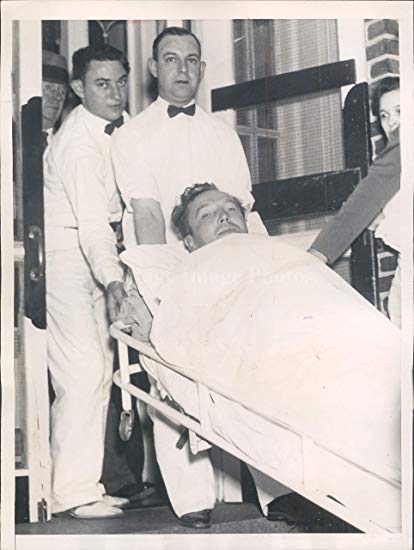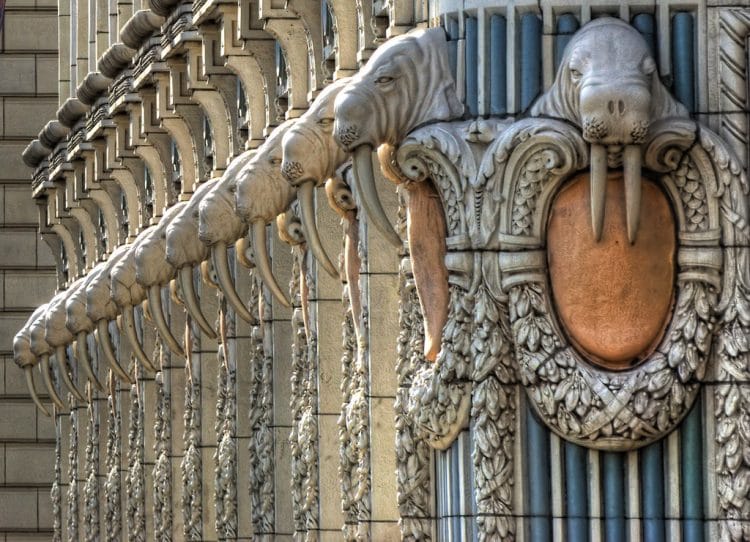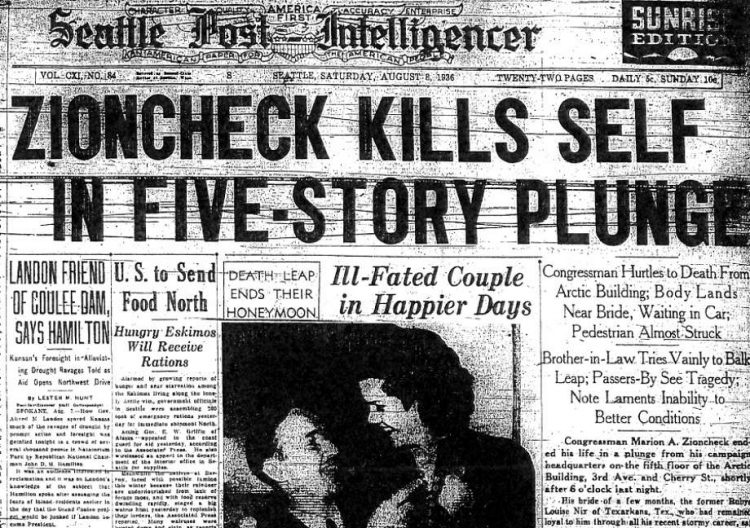Mental illness has always plagued humanity. In the amount of time humans have existed, just in these last few years has mental illness really been addressed and given the time and study it deserves in order to make advancements in the field and impact the lives of ourselves and those around us. August 7, 1936. A crisp breeze blew threw the cobblestone streets of Seattle. People walk the streets and seagulls sing the song of their people, regardless of who is listening. On 3rd avenue and Cherry street sits a hotel named “the Arctic Club” hotel. lined with beautiful and detailed carvings of walruses on the corners of the building, it is a work of art and architecture. On the fifth floor of this iconic building is a man named Marion Zioncheck, looking at the ground beneath him.

Zioncheck, a Polish immigrant, was born on December 5th, 1901 in Kety, Galincia, Poland. Four years later, he moved with his parents to Seattle in 1905. Graduating with a law degree from the illustrious university of Washington, he quickly made himself a prominent political figure in the emerald city. Zioncheck was elected to a seat in Congress, usurping then Republican incumbent Ralph A. Horr. During this time, the American public had a hard time trusting Herbert Hoover, his administration, and Republican colleagues due to their mishandling of the stock market which eventually led to the great depression. This allowed the democratic party to challenge, and eventually win, many seats in congress. Zioncheck was one of these democrats. Though Zioncheck’s work in congress was important in pushing forward FDR’s “New Deal” policies, his erratic behavior in office caused his work to go largely unnoticed; some of which included driving a car on the white house lawn and drunkenly dancing in water fountains late at night in Washington D.C.

Zioncheck was reported to suffer from serious bouts of pure happiness and crippling depression during these times. During his second term in congress, his wife Rubye – who had participated with him in his erratic behavior as his fiancé – separated after the two had been married a total of two months. The next day, June 1st, 1936, Zioncheck frantically went around town looking for his Rubye and committing other acts of delinquency. For this, Zioncheck was arrested and sent to the Gallinger Municipal Hospital Psychopathic Ward in D.C. Rubye returned to Zioncheck’s side and was informed by the doctor’s at Gallinger that his mental episode was caused by his busy lifestyle and heavy workload as a US congressman. After some tests, checks, and apparent improvement, Zioncheck was diagnosed with manic depressive disorder and moved from D.C. to a smaller facility in nearby Maryland. Zioncheck would eventually escape the facility and flee back to Washington state after a short time in the facility. He did this by jumping a seven-foot wall. Zioncheck’s crimes would eventually be dropped due to “congressional immunity” and he would be allowed to return to his familiar Seattle neighborhood.


Zioncheck, when asked by reporters from multiple news sources, informed the press that he would not seek reelection, citing the doctor’s diagnosis of manic depression as his reasoning for not running. After these comments were made King county prosecutor Warren G. Magnuson announced he would be campaigning to fill Zioncheck’s empty congressional seat. Magnuson and Zioncheck were allies and friends, so when Zioncheck heard the news, many believe he felt a sort of devastation and betrayal that his old friend would try and take his seat, despite his previous announcement he would not run for a third term in congress. It is believed by many that this was the final act that led Zioncheck to that fateful afternoon in August.

On the fifth floor of the famous Artic Club hotel in Seattle, Zioncheck’s mental status would cause him to leap from the window of his hotel room. He would fall to his death in front of his wife Rubye, who was waiting outside for him at the time. Found in Zioncheck’s possession was a simple note that read “My only hope in life was to improve the conditions of an unfair economic system that held no promises to those that all the wealth of even a decent chance to survive let alone live.” As a state, Washington mourned the loss of their first democratic senator. Both the University of Washington and the famed Boeing plant both took half a day off in order for their students and employees to mourn Zioncheck’s loss. Zioncheck is buried in the Evergreen-Washelli cemetery, Seattle’s largest cemetery. Both his grave site and death site can still be seen in Seattle to this day.

Washington state’s history is dotted with many dark figures such as Bundy, Ridgeway, Yates, and Jeff Bezos (Thanks for making everything near Seattle so expensive!) so Zioncheck’s story tends to be forgotten, but his story is important because of how precious the mind is and how susceptible humans can be to mental illnesses. This is my first article regarding my new place of residency, so I’m very excited to have written it. I wish I would’ve published the article sooner as the anniversary of Zioncheck’s suicide just passed a few days ago.

As a final note, if you are in a position similar to Zioncheck’s or dealing with any sort of depression, anxiety, etc., I implore you to please seek out help. Life can be cruel and tough, but there are places to go and people you can reach out to. You are loved and cared for. Be excellent to each other. Thanks for reading.











